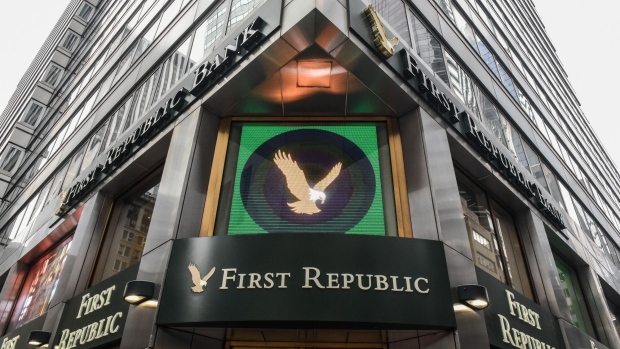Apr 28, 2023
First Republic’s Fate Uncertain After Stock’s Harrowing Tumble
, Bloomberg News

(Bloomberg) -- First Republic Bank’s week of harrowing stock drops and urgent work toward a deal to shore up its balance sheet ended with the lender’s fate in limbo.
The Federal Deposit Insurance Corp., keeping tabs on the bank’s deposits and funding, hasn’t reached a decision on intervening at the troubled lender, according to people with direct knowledge of the matter. Some senior officials there expect the firm’s management will continue pursuing talks for a private-sector deal to bolster its finances.
Still, the FDIC’s position could change if there’s an unforeseen development.
Meanwhile, larger lenders have started preparing for the possibility that the government seizes First Republic and asks them to bid on the bank or its assets, people close to the situation said, asking not to be named describing confidential preparations. While banks have been reluctant to put up money to rescue the firm in recent days, some are keen to make offers if it’s auctioned.
JPMorgan Chase & Co. and PNC Financial Services Group Inc. are among the big banks vying to buy First Republic in a deal that would come after a government seizure, the Wall Street Journal reported late Friday, citing people with knowledge of the matter. A seizure could take place as soon as this weekend, the newspaper said.
A spokesperson for the FDIC said late Friday that the agency doesn’t comment on “operating institutions.” Representatives for California’s banking regulator, which would take the lead in deciding whether the San Francisco-based lender has failed, didn’t respond to requests for comment.
“We are engaged in discussions with multiple parties about our strategic options while continuing to serve our clients,” a spokesperson for First Republic said in a statement at the close of regular business in California.
The company’s stock plunged by more than half at one point on Friday amid renewed concern that the FDIC might seize the bank. A few proposals for an industry-led rescue have surfaced in recent days. But they have yet to yield any deal.
With the stock down 97% this year, bankers and regulators have been stuck in a standoff, with both sides seeking to avoid steep losses and hoping the other will handle the troubled firm.
A group of 11 banks that deposited $30 billion into First Republic last month to give it time to find a solution have proved reluctant to invest in the firm itself, even if that means they might lose some cash in their accounts. Some stronger firms are waiting for the government to offer aid or put the bank in receivership, a resolution they view as cleaner — and potentially ending with a sale of business lines or assets at attractive prices.
But receivership is an outcome the FDIC would prefer to avoid in part because of the multibillion-dollar hit to its own deposit insurance fund. The agency is already planning to impose a special assessment on the industry to cover the cost of Silicon Valley Bank and Signature Bank’s failures last month.
Weighing on First Republic’s balance sheet is a mountain of low-interest loans, including an unusually large portfolio of jumbo mortgages to wealthy clients. Such debts have lost value amid interest-rate hikes.
The collapse of SVB in March stoked concerns about the soundness of regional lenders with such holdings, prompting wealthy depositors and businesses with uninsured deposits to yank their money. First Republic was left paying more for funding than it earns on many of its assets.
Still, the bank’s executives emphasized in an earnings report this week, the firm has ample cash reserves to continue meeting clients’ needs.
--With assistance from Lydia Beyoud.
(Updates with report on names of banks vying to buy First Republic in fifth paragraph)
©2023 Bloomberg L.P.





